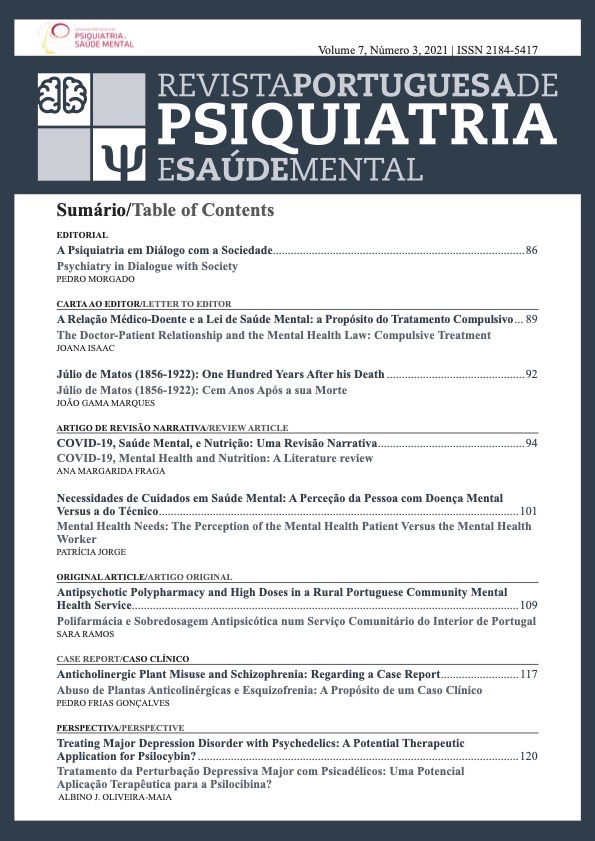COVID‑19, Mental Health and Nutrition: A Literature review
DOI:
https://doi.org/10.51338/rppsm.2021.v7.i3.223Keywords:
COVID-19, Mental Health, SARS-CoV-2, Immune System, Diet, Mediterranean, Diet, Feeding BehaviorAbstract
Since the pandemic was declared in March 2020 by World Health Organization, COVID‑19 has been responsible for a disruptive impact on health, economy, and interpersonal relationships, with significant repercussions on mental health and the eating habits. A bibliographic review was carried out through the PubMed database, which aimed to study the implications of COVID‑19 on the mental health and eating habits of individuals. The association between increased psychopathological symptoms and pandemics has been established throughout human history. During the COVID‑19 pandemic, studies that sought to assess the mental health of individuals who had been infected with SARS‑CoV‑2 and/or were in quarantine found an increased prevalence of psychopathological symptoms such as anxiety, sadness or fear. The duration of the quarantine, socioeconomic problems, false and/or inappropriate information and the neurotropism of the virus, were some of the risk factors pointed to the appearance of these symptoms. Likewise, the scientific community has also found a relationship between the quarantine period and depressive symptoms with increased consumption of comfort foods, with high energy density and low in nutrients. This not only increases the risk of developing chronic non‑communicable diseases, such as obesity and type 2 diabetes mellitus, but it also seems to influence the hypothalamic‑pituitary‑adrenal axis, with impairment of the immune system and an increase in mental illnesses such as depression. The immune response is, ultimately, the only way we have to overcome this pandemic. SARS‑CoV‑2 has had an important negative impact both on the mental health of the population and on their food choices, which conditions out immune response. Thus, more than only measures to prevent contamination, also to promote a healthy lifestyle seem to be the best strategies against COVID‑19, with a view to increase our “psychoneuroimmunity” to better overcome this pandemic.
Downloads
References
World Health Organization. WHO Coronavirus Disease (COVID‑19). [consultado Jan 2021] Disponível em: https://covid19.who.int.
Baig AM. Neurological Manifestations in COVID‑19 caused by SARS‑CoV‑2. CNS Neurosci Ther. 2020;26:499‑501. doi: 10.1111/cns.13372.
Szcześniak D, Gładka A, Misiak B, Cyran A, Rymaszewska J. The SARS‑CoV‑2 and mental health: From biological mechanisms to social consequences. Prog Neuropsychopharmacol Biol Psychiatry. 2021;104:110046.
Mazza G, De Lorenzo R, Conte C, Poletti S, Vai B, Bolletini I,et al. Anxiety and depression in COVID‑19 survivors: role of inflammatory and clinical predictors. Brain Behav Immun. 2020;89:594‑600. doi: 10.1016/j.bbi.2020.07.037.
Zhu N, Zhang D, Wang W, Li X, Yang B, Song J, et al; China Novel Coronavirus Investigating and Research Team. A Novel Coronavirus from Patients with Pneumonia in China, 2019. N Engl J Med. 2020;382:727‑33. doi: 10.1056/NEJMoa2001017.
Brooks SK, Webster RK, Smith LE, Woodland L, Wessely S, Greenberg N, et al. The psychological impact of quarantine and how to reduce it: rapid review of the evidence. Lancet. 2020;395:912‑20.
Shah K, Kamrai D, Mekala H, Mann B, Desai K, Patel RS. Focus on mental health during the coronavirus (COVID‑19) pandemic: applying learnings from the past outbreaks. Cureus. 2020;12: e7405.
Pisoschi AM, Pop A. The role of antioxidants in the chemistry of oxidative stress: a review. Eur J Med Chem. 2015;97:55–74
Harrell CS, Gillespie CF, Neigh GN. Energetic stress: The reciprocal relationship between energy availability and the stress response. Physiol Behav. 2016;166:43‑55. doi: 10.1016/j.physbeh.2015.10.009.
World Health Organization (WHO) Food and Nutrition Tips during Self‑Quarantine. [consultado Jan 2021] Disponível em: http://www.euro.who.int/en/health‑topics/health‑emergencies/coronavirus‑covid‑19/novel‑coronavirus2019‑ncov‑technical‑guidance/food‑and‑nutrition‑tips‑during‑self‑quarantine
Muscogiuri G, Barrea L, Savastano S, Colao A. Nutritional recommendations for CoVID‑19 quarantine. Eur J Clin Nutr. 2020;74:850‑1. doi: 10.1038/s41430‑020‑0635‑2.
Khoramipour K, Basereh A, Hekmatikar AA, Castell L, Ruhee RT, Suzuki K. Physical activity and nutrition guidelines to help with the fight against COVID‑19. J Sports Sci.2021;39:101‑7. doi: 10.1080/02640414.2020.1807089.
Cena H, Chieppa M. Coronavirus Disease (COVID‑19‑SARS‑CoV‑2) and Nutrition: Is Infection in Italy Suggesting a Connection? Front Immunol. 2020;11:944. doi: 10.3389/fimmu.2020.00944.
Lucas M, Mirzaei F, O’Reilly EJ, Pan A, Willett WC, Kawachi I, et al. Dietary intake of n‑3 and n‑6 fatty acids and the risk of clinical depression in women: a 10‑y prospective follow‑up study. Am J Clin Nutr. 2011;93:1337‑43. doi: 10.3945/ajcn.111.011817.
Direção‑Geral de Saúde. Novo Coronavírus COVID‑19 Alimentação. Direção‑Geral de Saúde. 2020. [consultado Jan 2021] Disponível em: https://covid19.min‑saude.pt
Trujillo‑Mayol I, Guerra‑Valle M, Casas‑Forero N, Sobral MM, Viegas O, Alarcón‑Enos J, et al. Western Dietary Pattern Antioxidant Intakes and Oxidative Stress: Importance During the SARS‑CoV‑2/COVID‑19 Pandemic. Adv Nutr. 2021;12:670‑81. doi: 10.1093/advances/nmaa171.
Rogers JP, Chesney E, Oliver D, Pollak TA, McGuire P, Fusar‑Poli P, et al. Psychiatric and neuropsychiatric presentations associated with severe coronavirus infections: a systematic review and meta‑analysis with comparison to the COVID‑19 pandemic. Lancet Psychiatry. 2020;7:611‑27. doi: 10.1016/S2215‑0366(20)30203‑0.
Hu Y, Chen Y, Zheng Y, You C, Tan J, Hu L, et al. Factors related to mental health of inpatients with COVID‑19 in Wuhan, China. Brain Behav Immun. 2020;89:587‑93. doi: 10.1016/j.bbi.2020.07.016.
Ma YF, Li W, Deng HB, Wang L, Wang Y, Wang PH, et al. Prevalence of depression and its association with quality of life in clinically stable patients with COVID‑19. J Affect Disord. 2020;275:145‑8. doi: 10.1016/j.jad.2020.06.033.
Jacobs LG, Paleoudis EG, Bari DL, Nyirenda T, Friedman T, Gupta A,et al. Persistence of symptoms and quality of life at 35 days after hospitalization for COVID‑19 infection. PLoS One. 2020;15:e0243882.
Deng J, Zhou F, Hou W, Silver Z, Wong CY, Chang O, et al. The prevalence of depression, anxiety, and sleep disturbances
in COVID‑19 patients: a meta‑analysis. Ann N Y Acad Sci. 2021;1486:90‑111. doi: 10.1111/nyas.14506.
Wang H, Xia Q, Xiong Z, Li Z, Xiang W, Yuan Y, et al. The psychological distress and coping styles in the early stages of the 2019 coronavirus disease (COVID‑19) epidemic in the general mainland Chinese population: A web‑based survey. PLoS One. 2020;15:e0233410.
Liu N, Zhang F, Wei C, Jia Y, Shang Z, Sun L,et al. Prevalence and predictors of PTSS during COVID‑19 outbreak in China hardest‑hit areas: Gender differences matter. Psychiatry Res. 2020;287:112921.
Munk AJL, Schmidt NM, Alexander N, Henkel K, Henning J. Covid‑19‑Beyond virology: Potentials for maintaining mental health during lockdown. PLos One. 2000;15:e0236688.
Wu T, Jia X, Shi H, Niu J, Yin X, Xie J, et al. Prevalence of mental health problems during the COVID‑19 pandemic:
A systematic review and meta‑analysis. J Affect Disord. 2021;281:91‑8. doi: 10.1016/j.jad.2020.11.117.
Luo M, Guo L, Yu M, Jiang W, Wang H. The psychological and mental impact of coronavirus disease 2019 (COVID‑19) on medical staff and general public ‑ A systematic review and meta‑analysis. Psychiatry Res. 2020;291:113190. doi: 10.1016/j.psychres.2020.113190.
Torres SJ, Nowson CA. Relationship between stress, eating behavior, and obesity. Nutrition. 2007;23:887e94.
Kodish SR, Rohner F, Beauliere JM, Daffe M, Ayoya MA, Wirth JP,et al. Implications of the Ebola vírus disease outbreak in Guinea: Qualitative findings to inform future health and nutrition‑related responses. PLoS One. 2018;13: e0202468.
Batlle‑Bayer L, Aldaco R, Bala A, Puig R, Laso J, Margallo M,et al. Environmental and nutritional impacts of dietary changes in Spain during the COVID‑19 lockdown. Sci Total Environ. 2020;748:141410. 30. Ruiz‑Roso MB, de Carvalho P, Mantilla‑Escalante D, Ulloa N, Brun P, Acevedo‑Correa D, et al. Covid‑19 confinement and changes of adolescent’s dietary trends in Italy, Spain, Chile, Colombia and Brazil. Nutrients. 2020;12:1807.
Mikolajczyk RT, El Ansari W, Maxwell AE. Food consumption frequency and perceived stress and depressive symptoms among students in three European countries. Nutr J. 2009;8:31. doi: 10.1186/1475‑2891‑8‑31.
Sánchez‑Villegas A, Henríquez‑Sánchez P, Ruiz‑Canela M, Lahortiga F, Molero P, Toledo E, et al. A longitudinal analysis of diet quality scores and the risk of incident depression in the SUN Project. BMC Med. 2015;13:197. doi: 10.1186/s12916‑015‑0428‑y.
Pérez‑Martínez P, García‑Ríos A, Delgado‑Lista J, Pérez‑Jiménez F, López‑Miranda J. Mediterranean diet rich in olive oil and obesity, metabolic syndrome and diabetes mellitus. Curr Pharm Des. 2011;17:769‑77. doi: 10.2174/138161211795428948.
Di Renzo L, Gualtieri P, Pivari F, Soldati L, Attiná A, Cinelli G, et al. Eating habits and lifestyle changes during COVID‑19
lockdown: an Italian survey. J Transl Med. 2020;18:1–15.
Rodríguez‑Pérez C, Molina‑Montes E, Verardo V, Artacho R, García‑Villanova B, Guerra‑Hernández EJ, et al. Changes in Dietary Behaviours during the COVID‑19 Outbreak Confinement in the Spanish COVIDiet Study. Nutrients. 2020;12:1730. doi: 10.3390/nu12061730.
Yeoh YK, Zuo T, Lui GC, Zhang F, Liu Q, Li AY, et al. Gut microbiota composition reflects disease severity and dysfunctional immune responses in patients with COVID‑19. Gut. 2021;70:698‑706. doi: 10.1136/gutjnl‑2020‑323020.
Rishi P, Thakur K, Vij S, Rishi L, Singh A, Kaur IP, et al. Diet, Gut Microbiota and COVID‑19. Indian J Microbiol. 2020;60:1‑10.
doi: 10.1007/s12088‑020‑00908‑0.
Dhar D, Mohanty A. Gut microbiota and COVID‑19‑ possible link and implications. Virus Res. 2020; 285: 198018. doi: 10.1016/j.virusres.2020.198018.
Mahan LK, Escott‑Stump S. Krause’s food & nutrition therapy. 12 ed. St Louis: Elsevier; 2008.
Ibarra O, Gili M, Roca M, Vives M, Serrano MJ, Pareja A, et al. The Mediterranean diet and micronutrient levels in depressive patients Nutr Hosp. 2014 3;31:1171‑5. doi: 10.3305/nh.2015.31.3.8124.
Yary T, Lehto SM, Tolmunen T, Tuomainen T‑P, Kauhanen J, Voutilainen S, et al. Dietary magnesium intake and the incidence of depression: A 20‑year follow‑up study. J Affect Disord. 2016;193:94‑8. doi: 10.1016/j.jad.2015.12.056.
Sánchez‑Villegas A, Henríquez‑Sánchez P, Ruiz‑Canela M, Lahortiga F, Molero P, Toledo E, et al. A longitudinal analysis of diet quality scores and the risk of incident depression in the SUN Project. BMC Med. 2015;13:197. doi: 10.1186/s12916‑015‑0428‑y.
Sánchez‑Villegas A, Delgado‑Rodríguez M, Alonso A, Schlatter J, Lahortiga F, Majem LS, et al. Association of the Mediterranean dietary pattern with the incidence of depression: the Seguimiento Universidad de Navarra/University of Navarra follow‑up (SUN) cohort. Arch Gen Psychiatry. 2009;66:1090‑8. doi: 10.1001/archgenpsychiatry.2009.129.
Skarupski KA, Tangney C, Li H, Evans D, Morris M. Mediterranean diet and depressive symptoms among older adults over time. J Nutr Health Aging. 2013;17:441‑5. doi: 10.1007/s12603‑012‑0437‑x.
Yilmaz C, Gokmen V, Neuroactive compounds in foods: Occurrence, mechanism and potential health effects. Food Res Int, 2020; 128: 108744.
Tabrizi A, Khalili L, Homayouni‑Rad A, Pourjafar H, Dehghan P, Ansari F. Prebiotics, as promising functional food to patients with psychological disorders: a review on mood disorders, sleep, and cognition. NeuroQuantology. 2019;17:1–9.
Grochowska M, Wojnar M, Radkowski M. The gut microbiota in neuropsychiatric disorders. Acta Neurobiol Exp. 2018;78:69‑81.
Kelly J, Borre Y, Aidy S, Deane J, Patterson E, Kennedy P et al. P.4.001 Transferring the blues: depression‑associated gut microbiota induces neurobehavioural changes in the rat. J Psychiatr Res. 2016;82:109‑18. doi: 10.1016/j.jpsychires.2016.07.019.
Dinan TG, Cryan JF. Mood by microbe: towards clinical translation. Genome Med. 2016 6;8:36. doi: 10.1186/s13073‑016‑0292‑1.








